3 Big Notes on the RPT's Stop Sexualizing Texas Kids Priority, Part 2
It's not just schools; they're seeking restrictions on books in stores and public libraries, too.
At the end of my last post, I said part two of this series would document the homophobia and transphobia animating the leaders of the Republican Party of Texas’s (unfortunately) successful “Stop Sexualizing Texas Kids” initiative. I’ll still do that post soon, but I’m scrambling the order of the series because of something one of those leaders tweeted last weekend. SREC Committeewoman Christin Bentley, who serves as spokesperson for the initiative, wrote about her strategy for framing the books issue for Texas legislators. “I sent our legislators one #FilthyBook example per day in order to defeat the radical left’s dishonest messaging about so-called ‘book bans.’ I highly recommend doing the same in other states, and I can share my resources.”
Two things: First, she’s right to brag, and smart to recommend her strategy to book banners in other states. It was shocking how easily HB 900 sailed through the legislature, and I attribute that to the fact that legislators believed that there was a groundswell of angry parental support for the bill and that the books in question were properly defined by a few out-of-context passages. Both of those things are false, but that didn’t matter. Bentley and her crew hustled, and they had a message that worked, and that emboldened extremist legislators and cowed moderates. Moving forward, we need to get ahead of their falsehoods.
But the thing that really got me this morning was her (again, false) framing that the idea that books are currently being banned is “dishonest messaging” from “the radical left.” The shock quotes, y’all.
You know her argument, right? We’re not banning books, we’re just choosing age appropriate books for schools. The premise is that books are still available at libraries and bookstores, so it’s not really a ban to remove them from schools.
So I decided to bump up this post about the many ways Bentley and her allies have sought to ban books outside of school libraries—for children and adults, obliterating parental rights and 1st-Amendment jurisprudence. Because when you study this group, a pattern becomes clear: they want to legislate what can be written, published, sold, and distributed in the state of Texas. And while some of their legislative solutions are limited to restricting books accessible to people under 18 years old, not all are. Further, underlying all of the measures is an urge to punish everyone involved in the production and consumption of books they dislike—authors, publishers, vendors, sellers, librarians, teachers, and parents.
You want examples? I’ve got examples.
Let’s start with bookstores. First of all, I mentioned in my last post that the “Stop Sexualizing Texas Kids” (SSTK) subcommittee hopes to use an anti-human-trafficking law to persecute books in Texas. While their legal reasoning is specious, it’s also worth noting that the law they’re hoping to hijack is not about schools—it applies to any person in Texas. If distributing Let’s Talk About It is “grooming” for a teacher or librarian, then it’s also “grooming” for a mom buying the book for her sixteen-year-old daughter, or for a clerk at Barnes & Noble selling it to a seventeen-year-old customer. That’s a trend in the legislative solutions recommended by the SSTK subcommittee. Their proposed changes to the definition of "harmful to minors” in the Texas Penal Code would also apply to everyone—parents, booksellers, librarians, teachers—in the state.1
Lest you think this is accidental, SSTK members have specifically said that they hope to limit what books can be sold in bookstores in Texas. Bentley, for example, told an audience in the Hill Country last month that “when we allow these things to even be sold to children in the bookstores, we’re complicit. We’re allowing it. We have allowed way too much.”
That’s the general view: society is making available books that children should not be able to access. But Bentley and Co. have also gotten into specifics. In a tweet last month, Bentley expressed anger that the book Nick and Charlie is available in the Young Adult section of Barnes & Noble. Bentley tagged the Texas Legislature (#txlege) and wrote, “Books that induce children into illegal and harmful behaviors should not be marketed/sold to children.” That’s a pretty broad category of books! Imagine what she’s describing: a sixteen-year-old boy stops at Barnes & Noble on his way home from his work at Home Depot and decides to pick up The Sun Also Rises (a book his AP Lit teacher recommended) and longtime teen-boy favorite On the Road. He also grabs The Bell Jar as a present for his bookish girlfriend. He walks up to the counter, gets carded, and then is told he can’t buy them without parental permission because they depict prostitution, alcoholism, drug use, car theft, premarital sex, and suicide.2
Additionally, in April Bentley tweeted, “We aim to strengthen the law to include those who attempt to sneak pornographic depictions into books marketed and sold to children.” That suggests that authors are as much a target of Bentley’s designs as book vendors and distributors.
That tweet is not the only place Bentley has connected authors to her attempts to change Texas laws. In a legislative update in April, she described the “as a whole” clause of Texas obscenity law as a “loophole” authors use to “get away” with marketing “erotica” to children. Her full quote: “We know that authors who are writing materials that are essentially erotica about children and marketed to children get away with it, they get away with these sexualized materials because of the loopholes in harmful materials definition.”
To be clear, these aren’t calls to use 1st-Amendment rights to boycott booksellers—they’re statements of intent to legislate what can be written, published, sold, and distributed in Texas.
But the group’s designs on bookstores are vague and undeveloped compared to their plans for attacking public libraries. On a podcast that aired last week, Bentley said, “We’re looking at what we can do locally to help support getting books out of the schools, out of the public libraries, and also raising community standards through city ordinances.”

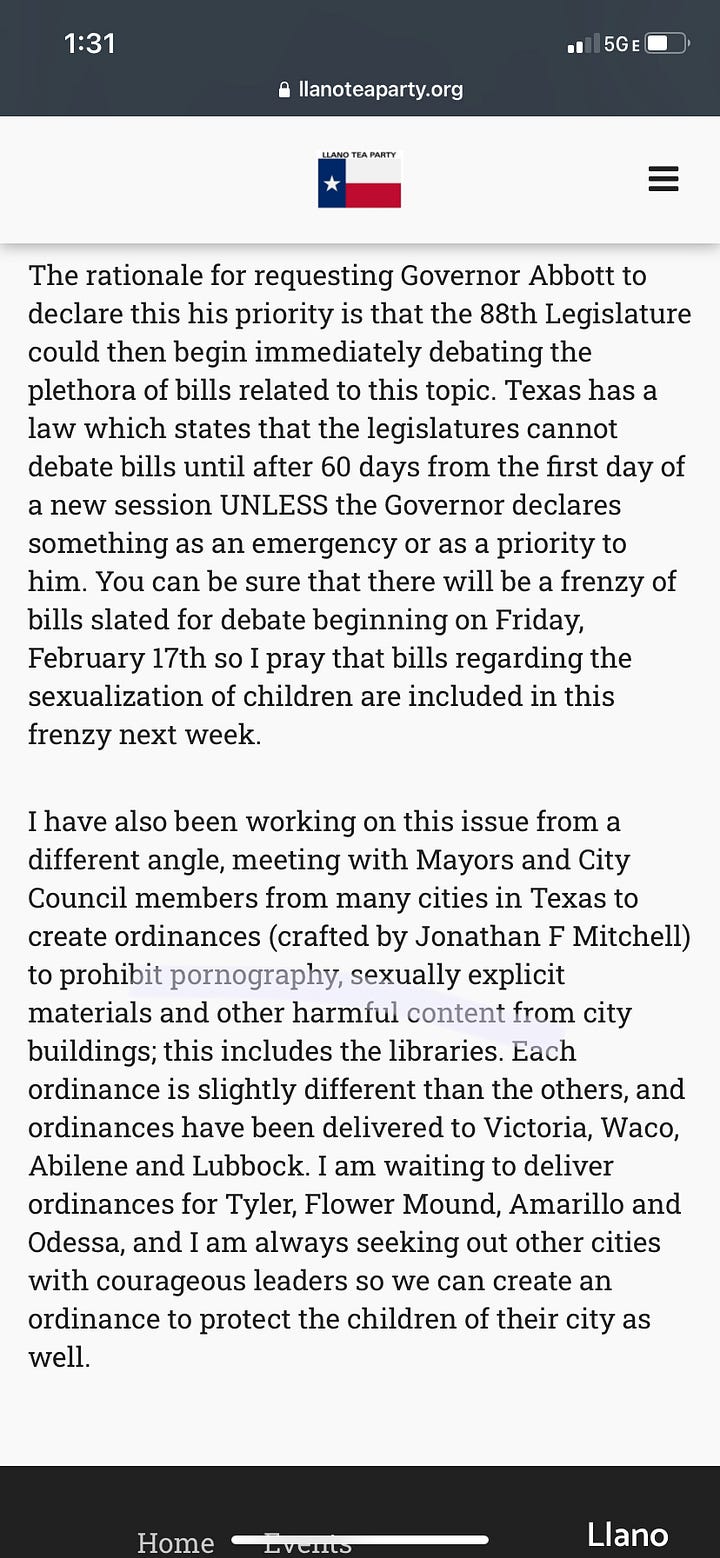
Specifically, Bentley seems to be referring to her SSTK colleague Bonnie Wallace’s work with attorney Jonathan Mitchell.3 Mitchell was instrumental in helping to draft the legal strategy behind SB8, the Texas “abortion bounty” law. Wallace, in turn, is one of the members of Llano County’s library advisory board; she was appointed as part of a conservative takeover of the library system that was triggered when librarians refused to remove books extremists deemed “pornographic.”4 In February, Wallace said that she and Mitchell were working to create ordinances “to prohibit pornography, sexually explicit materials and other harmful content from city buildings; this includes the libraries.”
One such ordinance was delivered to Abilene. It would forbid the library to acquire “any book, magazine, or publication containing filth, pornography, or immoral content, or place or maintain any such book on its shelves or in its catalogue.” It would also forbid the library from placing in any section designated for minors “any book, magazine, or publication that contains depictions or descriptions” of transvestism, cross-dressing, gender dysphoria, transgenderism, or “gender identities inconsistent with biological sex.”
Wallace claimed that similar ordinances had been delivered to Victoria, Waco, and Lubbock and that she was planning to deliver them to Tyler, Flower Mound, Amarillo and Odessa. As far as I know, no action has been taken on these ordinances in any city. But Bentley’s comments since HB 900’s passage suggest this is going to be a new push from the Texas GOP.
Library ordinances. Laws regulating bookstores. The broadening of the definition of “materials harmful to minors” and “child grooming.” I’ll say this: When it comes to inventing new methods for banning books, members of the “Stop Sexualizing Texas Kids” subcommittee have creative, fertile minds. But what all of their moves have in common is a certainty that their moral judgment should stand in for the views of other Texans. In my next post, we’ll explore what that means for LGBTQ Texans.
Someone asked on Twitter: Doesn’t this group claim to care about “parents’ rights”? They do, but they also think their judgments supersede the rights of other parents. “The state has a compelling interest to protect children from sexualization,” Bentley told an audience last month. “It is not a parental rights in education issue, or a parental rights issue. The state has a compelling interest to act.”
Lest you think this unrealistic reading of the group’s intent, all of these books—which have been read by teenagers for decades—contain far more objectionable content than Nick and Charlie. Bentley complained about the fact that Nick and Charlie contains an image of its two (male) protagonists topless in what they call an after-sex selfie, and that the book contains a scene in which they drink alcohol. (Of course, the larger, unstated objection is likely that Nick and Charlie depicts a same-sex relationship. More on that in my next post.)
Asher Price, of Axios Austin, broke this story in February.
Those “pornographic” books included Isabel Wilkerson’s Caste and Dawn Wilkerson’s I Need a New Butt! series.




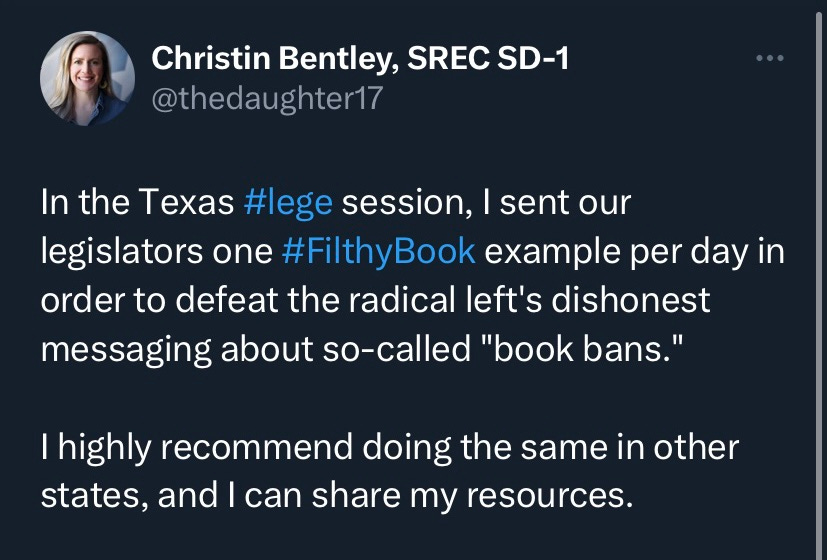
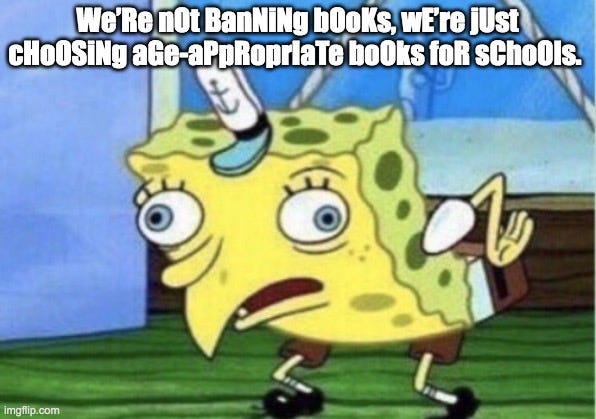
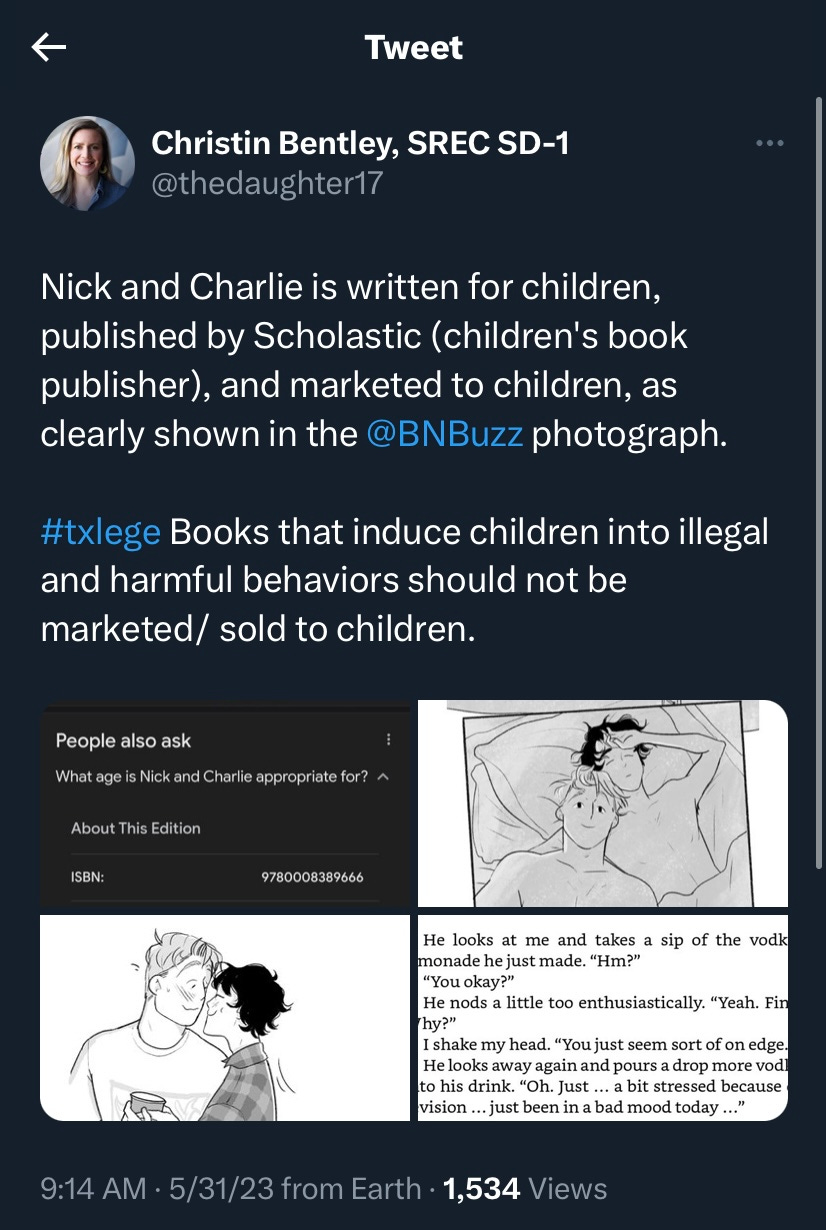
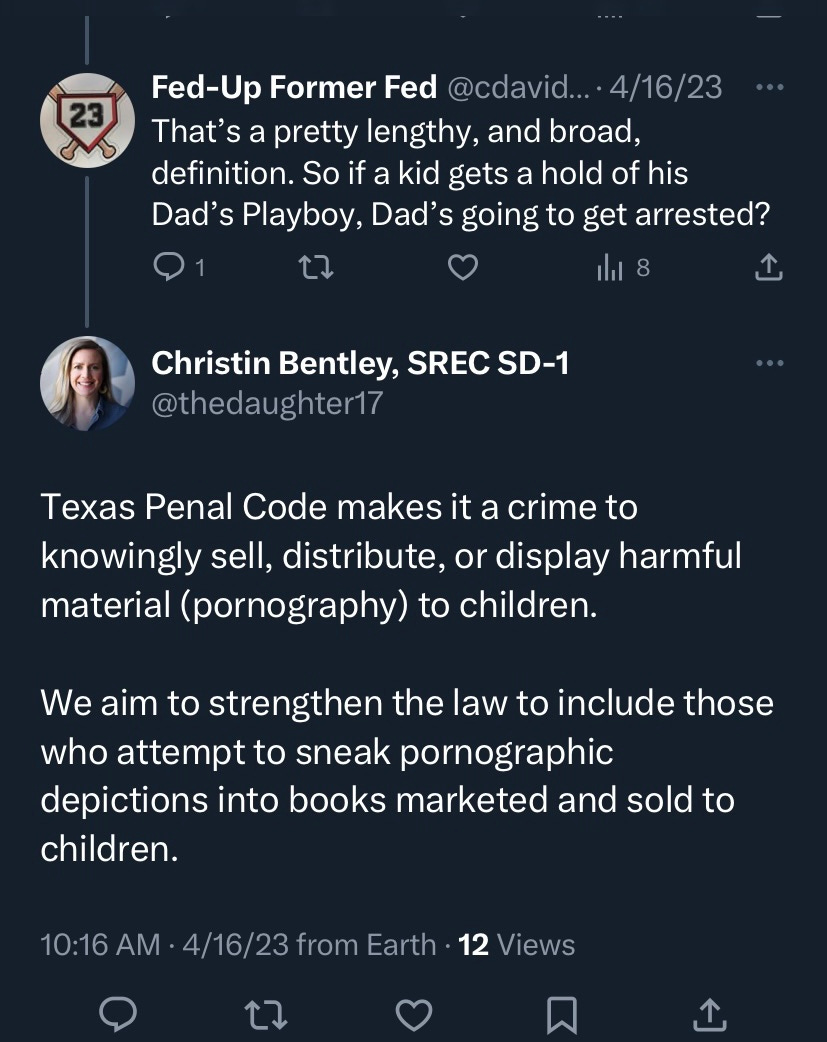

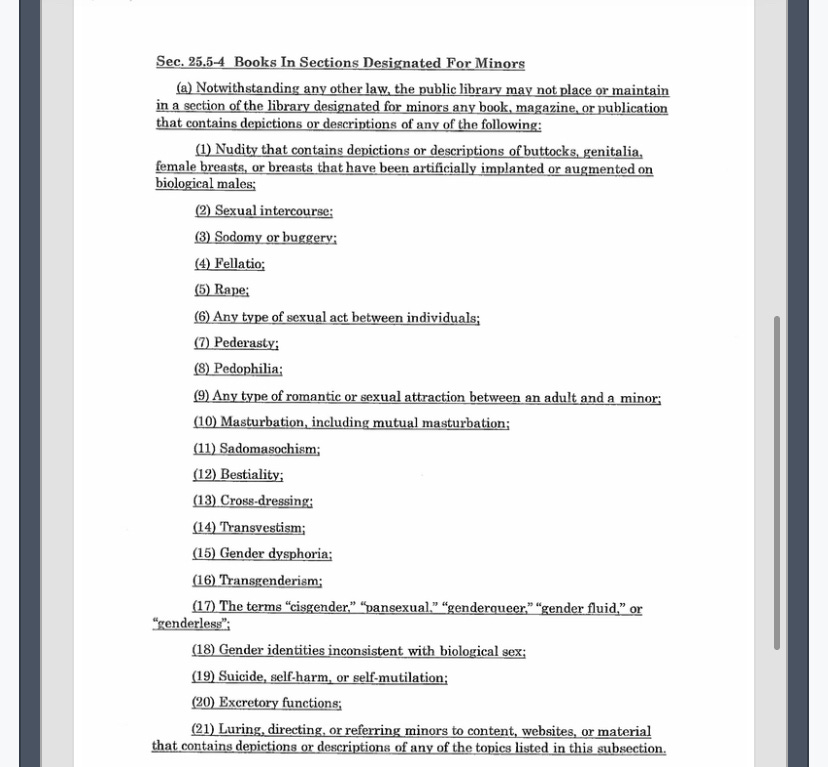
You probably don't remember me, but we went to Nolan together. In any case, I'm really grateful you're writing about this and wish you all the best in this fight. Best wishes from Santa Barbara, California. (Nathaniel Rich)
As always, thank you for diving so deep into this. I'll be sharing your posts with others!